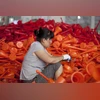Nations made progress on a treaty to end plastic pollution, finishing the latest round of negotiations in Canada early Tuesday amid sharp disagreements about whether to put global limits on plastic production.
For the first time in the process, negotiators discussed the text of what is supposed to become a global treaty. Delegates and observers at the Intergovernmental Negotiating Committee on Plastic Pollution called it a welcome sign that talk shifted from ideas to treaty language at this fourth of five scheduled meetings.
Most contentious is the idea of limiting how much plastic is manufactured. That remains in the text over the strong objections of plastic-producing countries and companies and oil and gas exporters. Most plastic is made from fossil fuels and chemicals.
As the Ottawa session ended, the committee agreed to keep working on the treaty before its final meeting later this year in South Korea.
The preparations for that session will focus on how to finance the implementation of the treaty, assess the chemicals of concern in plastic products and look at product design. Rwanda's representative said negotiators ignored the elephant in the room by not addressing plastic production.
In the end, this is not just about the text, it's not just about the process," said Jyoti Mathur-Filipp, executive secretary of the committee. "It is quite simply about providing a better future for generations and for our loved ones.
Stewart Harris, an industry spokesperson with the International Council of Chemical Associations, said the members want a treaty that focuses on recycling plastic and reuse, sometimes referred to as circularity.
More From This Section
They don't want a cap on plastic production, and think chemicals should not be regulated through this agreement. Harris said the association was pleased to see governments coming together and agreeing to complete additional work, especially on financing and plastic product design.
Dozens of scientists from the Scientists' Coalition for an Effective Plastics Treaty came to the meeting to provide research on plastic pollution to negotiators, in part, they said, to dispel misinformation.
I heard yesterday that there's no data on microplastics, which is verifiably false: 21,000 publications on micro and nanoplastics have been published, said Bethanie Carney Almroth, an ecotoxicology professor at Sweden's University of Gothenburg who co-leads the coalition. It's like Whac-A-Mole.
She said scientists were being harassed and intimidated by lobbyists and she reported to the UN that a lobbyist yelled in her face at a meeting.
Despite their differences, the countries represented share a common vision to move forward in the treaty process, Ecuador's chief negotiator, Walter Schuldt, said.
Because at the end of the day, we're talking about the survival of the future of life, not only of human life but all sorts of life on this planet, he said in an interview.
The treaty talks began in Uruguay in December 2022 after Rwanda and Peru proposed the resolution that launched the process in March 2022. Progress was slow during Paris talks in May 2023 and in Nairobi in November as countries debated rules for the process.
When thousands of negotiators and observers arrived in Ottawa, Luis Vayas Valdivieso, the committee chair from Ecuador, reminded them of their purpose to deliver a future free of plastic pollution. He asked them to be ambitious.
The delegates have been discussing not only the scope of the treaty, but chemicals of concern, problematic and avoidable plastics, product design, and financing and implementation.
Delegates also streamlined the unwieldy collection of options that emerged from the last meeting.
We took a major step forward after two years of lots of discussion. Now we have text to negotiate, said Bjrn Beeler, international coordinator for the International Pollutants Elimination Network. Unfortunately, much more political will is needed to address the out of control escalating plastic production.
Many travelled to Ottawa from communities affected by plastic manufacturing and pollution. Louisiana and Texas residents who live near petrochemical plants and refineries handed out postcards aimed at the US State Department saying, Wish you were here."
They travelled together as a group from the Break Free From Plastic movement, and asked negotiators to visit their states to experience the air and water pollution firsthand.
This is still the best option we have to see change in our communities. They're so captured by corporations. I can't go to the parish government, said Jo Banner, of the St John the Baptist Parish in Louisiana. It feels this is the only chance and hope I have of helping my community repair from this, to heal.
Members of an Indigenous Peoples' Caucus held a news conference Saturday to say microplastics are contaminating their food supply and the pollution threatens their communities and ways of life guaranteed to them in perpetuity. They felt their voices weren't being heard.
We have bigger stakes. These are our ancestral lands that are being polluted with plastic, Juressa Lee of New Zealand said after the event. We're rightsholders, not stakeholders. We should have more space to speak and make decisions than the people causing the problem.
In the Bay of Plenty, a source of seafood on New Zealand's northern coast, the sediment and shellfish are full of tiny plastic particles. They regard nature's resources as treasures, Lee added.
Indigenous ways can lead the way," Lee said. "What we're doing now clearly is not working.
Vi Waghiyi travelled from Alaska to represent Arctic Indigenous peoples. She's reminding decision-makers that this treaty must protect people from plastic pollution for generations to come.
She said, We come here to be the conscience, to ensure they make the right decision for all people.
)